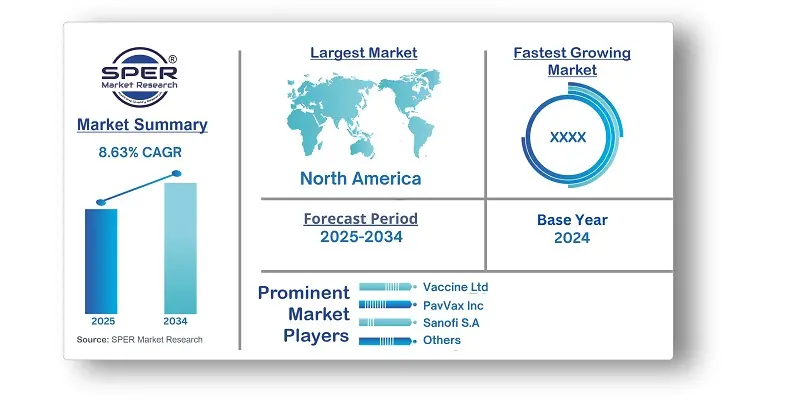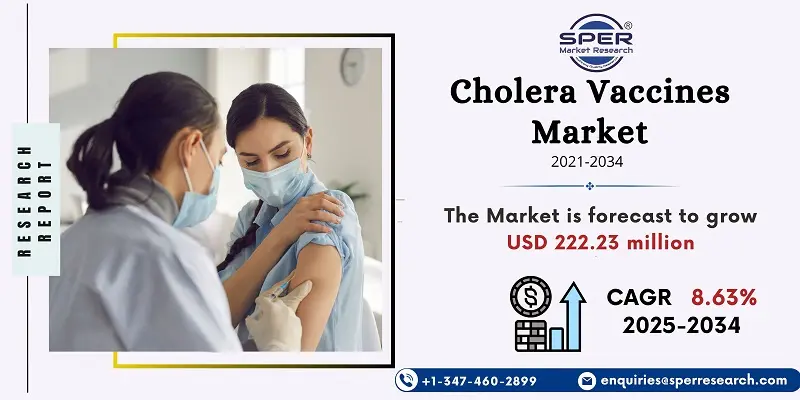
Cholera Vaccines Market Size, CAGR Status, Growth Drivers, Key player and Future Outlook
Cholera Vaccines Market Growth, Size, Trends Analysis - By Type, By Product, By Distribution Channel - Regional Outlook, Competitive Strategies and Segment Forecast to 2034
| Published: Feb-2025 | Report ID: HLCA2550 | Pages: 1 - 228 | Formats*: |
| Category : Healthcare | |||


| Report Metric | Details |
| Market size available for years | 2021-2034 |
| Base year considered | 2024 |
| Forecast period | 2025-2034 |
| Segments covered | By Type, By Product, By Distribution Channel. |
| Regions covered | North America, Latin America, Asia-Pacific, Europe, and Middle East & Africa. |
| Companies Covered | Valneva SE, Sanofi S.A, Astellas Pharma, Inc, Emergent BioSolutions Inc, PavVax Inc, EuBiologics Co., Ltd, Shantha Biotechnics Limited, Hilleman Laboratories, Astellas Pharma Inc, Incepta Vaccine Ltd, Vabiotech. and others. |
- Global Cholera Vaccines Market Size (FY'2021-FY'2034)
- Overview of Global Cholera Vaccines Market
- Segmentation of Global Cholera Vaccines Market By Type (Whole Cell v. Cholerae O1 with Recombinant B- subunit, Killed Oral O1 and O139)
- Segmentation of Global Cholera Vaccines Market By Product (Vaxchora, Dukoral, Shanchol, Other products)
- Segmentation of Global Cholera Vaccines Market By Distribution Channel (Hospital Pharmacy, Retail Pharmacy, Other)
- Statistical Snap of Global Cholera Vaccines Market
- Expansion Analysis of Global Cholera Vaccines Market
- Problems and Obstacles in Global Cholera Vaccines Market
- Competitive Landscape in the Global Cholera Vaccines Market
- Details on Current Investment in Global Cholera Vaccines Market
- Competitive Analysis of Global Cholera Vaccines Market
- Prominent Players in the Global Cholera Vaccines Market
- SWOT Analysis of Global Cholera Vaccines Market
- Global Cholera Vaccines Market Future Outlook and Projections (FY'2025-FY'2034)
- Recommendations from Analyst
1.1. Scope of the report1.2. Market segment analysis
2.1. Research data source
2.1.1. Secondary Data2.1.2. Primary Data2.1.3. SPERs internal database2.1.4. Premium insight from KOLs
2.2. Market size estimation
2.2.1. Top-down and Bottom-up approach
2.3. Data triangulation
4.1. Driver, Restraint, Opportunity and Challenges analysis
4.1.1. Drivers4.1.2. Restraints4.1.3. Opportunities4.1.4. Challenges
5.1. SWOT Analysis
5.1.1. Strengths5.1.2. Weaknesses5.1.3. Opportunities5.1.4. Threats
5.2. PESTEL Analysis
5.2.1. Political Landscape5.2.2. Economic Landscape5.2.3. Social Landscape5.2.4. Technological Landscape5.2.5. Environmental Landscape5.2.6. Legal Landscape
5.3. PORTERs Five Forces
5.3.1. Bargaining power of suppliers5.3.2. Bargaining power of buyers5.3.3. Threat of Substitute5.3.4. Threat of new entrant5.3.5. Competitive rivalry
5.4. Heat Map Analysis
6.1. Global Cholera Vaccines Market Manufacturing Base Distribution, Sales Area, Product Type6.2. Mergers & Acquisitions, Partnerships, Product Launch, and Collaboration in Global Cholera Vaccines Market
7.1. Whole Cell v. Cholerae O1 with Recombinant B- subunit7.2. Killed Oral O1 and O139
8.1. Vaxchora8.2. Dukoral8.3. Shanchol8.4. Other products
9.1. Hospital Pharmacy9.2. Retail Pharmacy9.3. Other
10.1. Global Cholera Vaccines Market Size and Market Share
11.1. Asia-Pacific
11.1.1. Australia11.1.2. China11.1.3. India11.1.4. Japan11.1.5. South Korea11.1.6. Rest of Asia-Pacific
11.2. Europe
11.2.1. France11.2.2. Germany11.2.3. Italy11.2.4. Spain11.2.5. United Kingdom11.2.6. Rest of Europe
11.3. Middle East and Africa
11.3.1. Kingdom of Saudi Arabia11.3.2. United Arab Emirates11.3.3. Qatar11.3.4. South Africa11.3.5. Egypt11.3.6. Morocco11.3.7. Nigeria11.3.8. Rest of Middle-East and Africa
11.4. North America
11.4.1. Canada11.4.2. Mexico11.4.3. United States
11.5. Latin America
11.5.1. Argentina11.5.2. Brazil11.5.3. Rest of Latin America
12.1. Valneva SE
12.1.1. Company details12.1.2. Financial outlook12.1.3. Product summary12.1.4. Recent developments
12.2. Sanofi S.A
12.2.1. Company details12.2.2. Financial outlook12.2.3. Product summary12.2.4. Recent developments
12.3. Emergent BioSolutions Inc
12.3.1. Company details12.3.2. Financial outlook12.3.3. Product summary12.3.4. Recent developments
12.4. PaxVax Inc
12.4.1. Company details12.4.2. Financial outlook12.4.3. Product summary12.4.4. Recent developments
12.5. EuBiologics Co., Ltd
12.5.1. Company details12.5.2. Financial outlook12.5.3. Product summary12.5.4. Recent developments
12.6. Shantha Biotechnics Limited
12.6.1. Company details12.6.2. Financial outlook12.6.3. Product summary12.6.4. Recent developments
12.7. Hilleman Laboratories
12.7.1. Company details12.7.2. Financial outlook12.7.3. Product summary12.7.4. Recent developments
12.8. Astellas Pharma Inc
12.8.1. Company details12.8.2. Financial outlook12.8.3. Product summary12.8.4. Recent developments
12.9. Incepta Vaccine Ltd
12.9.1. Company details12.9.2. Financial outlook12.9.3. Product summary12.9.4. Recent developments
12.10. Vabiotech
12.10.1. Company details12.10.2. Financial outlook12.10.3. Product summary12.10.4. Recent developments
12.11. Others
SPER Market Research’s methodology uses great emphasis on primary research to ensure that the market intelligence insights are up to date, reliable and accurate. Primary interviews are done with players involved in each phase of a supply chain to analyze the market forecasting. The secondary research method is used to help you fully understand how the future markets and the spending patterns look likes.
The report is based on in-depth qualitative and quantitative analysis of the Product Market. The quantitative analysis involves the application of various projection and sampling techniques. The qualitative analysis involves primary interviews, surveys, and vendor briefings. The data gathered as a result of these processes are validated through experts opinion. Our research methodology entails an ideal mixture of primary and secondary initiatives.



Frequently Asked Questions About This Report
PLACE AN ORDER
Year End Discount
Sample Report
Pre-Purchase Inquiry
NEED CUSTOMIZATION?
Request CustomizationCALL OR EMAIL US
100% Secure Payment






Related Reports
Our Global Clients
Our data-driven insights have influenced the strategy of 200+ reputed companies across the globe.




















